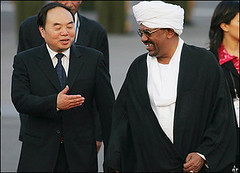
Sudanese President Omar al-Bashir Being Greeted By Chinese Official After Arriving in Beijing for the Sino-African Summit
Originally uploaded by Pan-African News Wire Photo File
Thu Jul 10, 2008 10:11pm BST
By Lesley Wroughton
WASHINGTON, July 10 (Reuters) - China is ramping up financing for power and transport projects in Africa, with the majority in four countries endowed with natural resources, according to a report by the World Bank on Thursday.
The report, which looks at the growing role of the Chinese government as a financier of infrastructure projects in Africa, estimates China's funding for roads, railways and power projects peaked at $7 billion in 2006 from just $1 billion a year between 2001-03.
The bulk of those commitments were to Nigeria, Angola, Sudan and Ethiopia and is welcome in a region where only one in four Africans have electricity, and travel along major export routes takes two to three times longer than in Asia.
But the World Bank said China was not the only emerging economic power financing infrastructure projects in Africa. India's Ex-Im Bank and Arab development funds are doing the same although China is by far the largest, it said.
In the power sector, China's investments have been in large hydropower schemes, and at the end of 2007 it was contributing $3.3 billion to 10 major hydropower projects amounting to some 6,000 megawatts of installed capacity.
When completed, these projects will raise total available hydropower generation capacity in Sub-Saharan Africa by around 30 percent, the Bank said.
Meanwhile, China's financing agreements to develop rail links, mainly in Nigeria, Gabon and Mauritania, totaled about $4 billion in 2007. This includes rehabilitation of more than 1,350 km of existing railway lines and construction of more than 1,600 km of new railroad. Africa's entire rail network is about 50,000 km.
Obiageli Ezekwesili, World Bank Vice President for Africa, said China's investments are helping fill $22 billion a year in financing needs for roads, railways and power across Africa.
She estimated that Africa's deficient infrastructure was costing the region as much as one percentage point a year of gross domestic product growth per capita.
"All of this signals an important and growing trend of south-south involvement in Africa that should create new opportunities," she told reporters, citing China's success at creating one of the the world's largest construction sectors.
TRADING FOR OIL
Yet, some say China's interest in building roads and power projects in Africa stems mostly from its desire to exploit the continent's vast oil, timber and mineral wealth to feed its booming economy.
Beijing has been criticized for turning a blind eye to human rights abuses and corruption in countries it invests in, such as Sudan and Zimbabwe.
China's imports of natural resources from Africa hit $22 billion in 2006, with oil alone accounting for 80 percent of the trade. As a result, China now depends on Africa for around 30 percent of its oil imports, 80 percent of its cobalt imports and 40 percent of its manganese imports.
Overall, Angola is by far China's largest trading partner followed by Republic of Congo, Equatorial Guinea, South Africa and Sudan.
The World Bank noted that China's $10 billion investments in Africa's oil sector are, however, barely a tenth of the $168 billion invested by other international oil companies.
World Bank economist Vivien Foster said China's interest in Africa came at a time when investment in infrastructure was at a low point, with traditional Western donors focused on combating diseases, such as HIV/AIDS and malaria.
Foster, the bank's lead economist in the Sustainable Development Department of the Africa region, said 10 percent of the total $16 billion committed by China to infrastructure projects in Africa has so far been completed and delivered. A further 25 percent is still under construction and remaining 65 percent were for projects that were already signed.
Foster said more than half of the projects -- about 35 in all -- relate to small financial contributions of less than $50 million while a handful of others are for more than $1 billion.
"This highlights a novel feature of the Chinese financing, which is the ability to raise very large sums of money for specific infrastructure projects," Foster added.
(Reporting by Lesley Wroughton; editing by Gary Crosse)
No comments:
Post a Comment